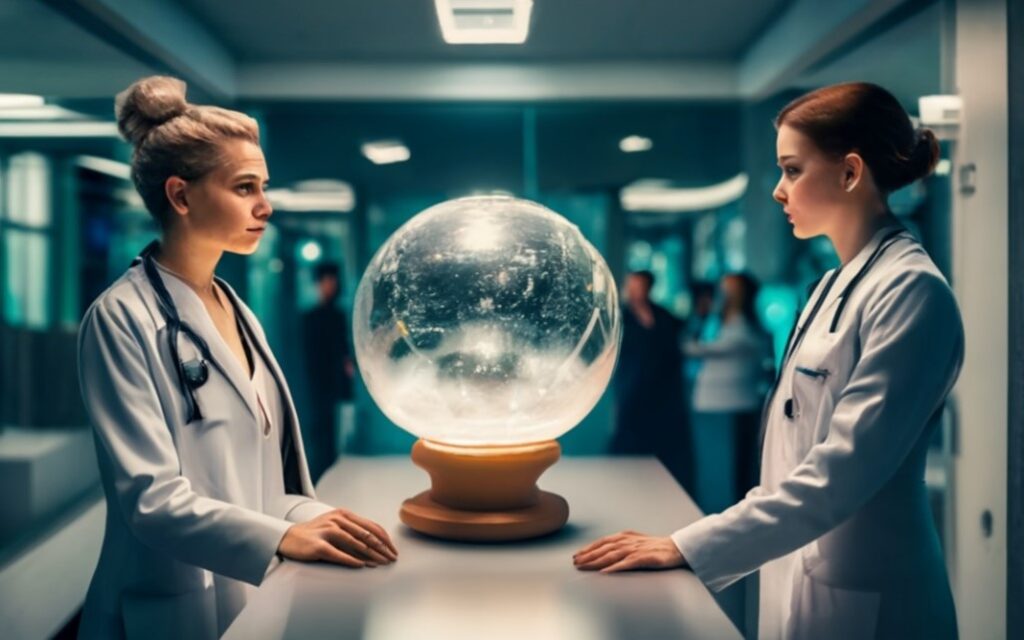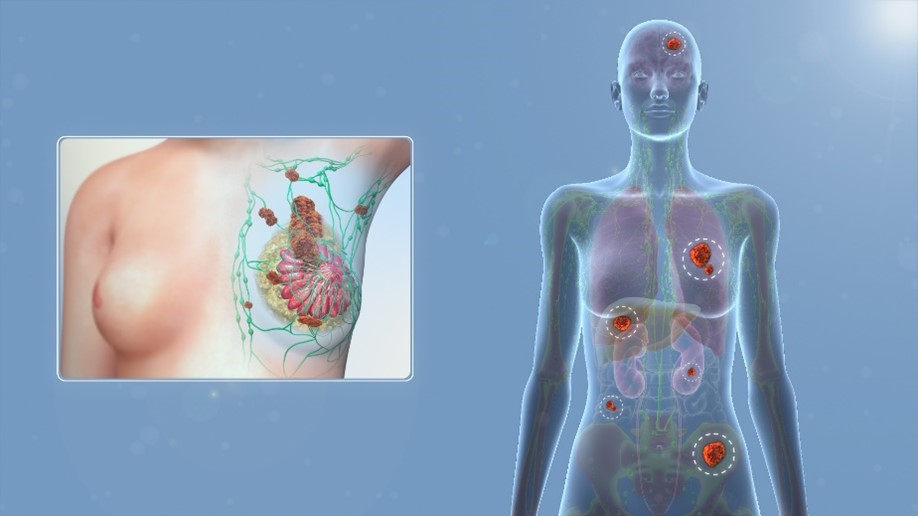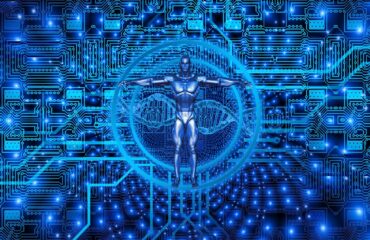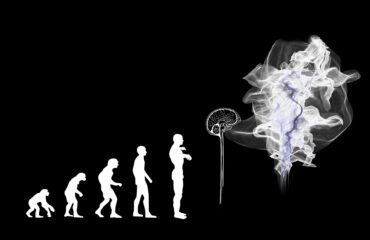
AI-assisted medical diagnostics can aid in the early detection of diseases, like a crystal ball might offer a glimpse into the future, helping doctors to predict and prevent potential health issues before they become serious problems. Image generated using Ideogram AI.
By Mariana Meneses
In an era of rapidly evolving technology, artificial intelligence is paving the way for groundbreaking advancements in medical diagnostics.
This article delves into three groundbreaking studies that stand as shining examples of how AI-powered technologies are reshaping the diagnoses of medical conditions and patient care. From early detection of childhood blindness to better breast cancer screening, AI innovations are making healthcare more accurate, accessible, and efficient with the promise of ushering in a new era of healthcare solutions.
Preventing Childhood Blindness

AI-assisted medical technologies can help more babies see the world. Credit: Wallpaper Flare.
Retinopathy of Prematurity (ROP) is an eye disorder that primarily affects premature infants. It occurs when the blood vessels in the retina, the light-sensitive tissue at the back of the eye, develop abnormally and lead to bleeding, scarring, and even retinal detachment if left untreated. ROP poses a serious threat to the visual development of premature infants and is considered one of the leading causes of childhood blindness.
Thus, early diagnosis and intervention are crucial to prevent the progression of the disease and to preserve the infant’s vision.
A study published in April 2023 by Siegfried K Wagner, from the University College London, and co-authors, reported the creation of easy-to-use deep learning models that accurately detect ROP in premature babies.
The models were custom-engineered and code-free, meaning that they were designed to be easily adapted and implemented in different settings, such as other medical imaging applications, without requiring extensive programming expertise. Outperforming traditional methods, they achieved high classification accuracy and inter-rater reliability as judged by multiple reviewers.
The study has substantive implications for improving the diagnosis and treatment of ROP, particularly in low-resource settings where access to expert ophthalmologists is limited. The models could also be adapted for other applications, improving outcomes and reducing costs.
A Breakthrough in Dementia Diagnosis
Dementia diagnosis is a complex and critical aspect of healthcare, as the aging population continues to grow. Dementia is a group of cognitive disorders that cause memory loss, impaired thinking, and difficulties with daily functioning. Accurate diagnosis of dementia is essential for early intervention and personalized care. Traditional methods of diagnosis rely on comprehensive clinical evaluations, cognitive tests, and medical history assessments.
However, emerging technologies are revolutionizing the diagnostic process.

Credit: Garrondo .
CognoSpeak is an AI tool developed by researchers at the University of Sheffield that uses speech technology to quickly assess the risk of dementia and Alzheimer’s disease.
The tool uses virtual agents to engage patients in cognitive tests and analyzes their language and speech patterns to provide a quick and efficient assessment. CognoSpeak is accessible via a web browser, allowing patients to take the test at home. Initial trials have shown the tool to be 90% accurate in distinguishing Alzheimer’s patients from cognitively healthy individuals.
By analyzing language patterns, speech nuances, and cognitive responses, tools like CognoSpeak offer a more objective and efficient approach to diagnosis. Furthermore, allowing individuals to engage in diagnostic assessments from their homes eases the strain on healthcare services and potentially enables earlier interventions for better quality of life.
The CognoSpeak project has received a significant boost with a £1.4 million grant from the UK National Institute for Health Research (NIHR).
This funding will enable the tool to be trialed more widely across memory clinics in the UK, with a goal of enrolling 700 participants in the study. This expanded testing will help to further evaluate the effectiveness of CognoSpeak in identifying language changes associated with cognitive decline, and ultimately improve the accuracy of diagnoses.
Revolutionizing Breast Cancer Detection
Breast cancer detection is a critical component of women’s healthcare, with early diagnosis playing a pivotal role in improving treatment outcomes. Mammogram screenings have long been the standard method for detecting breast abnormalities, but the interpretation of these images can be challenging and subjective. However, recent advancements in the field, such as AI-supported mammogram screening, hold significant promise for enhancing accuracy and efficiency.

Breast cancer is the most common cancer diagnosed in women in the United States after skin cancer. It can occur in both men and women, but it’s far more common in women. Credit: Manu5
Scientists have shown that AI algorithms can analyze mammograms with remarkable precision, often outperforming even experienced radiologists.
According to a study in The Lancet Oncology, by Kristina Lång, from Lund University, Sweden, and co-authors, AI-supported mammogram screening increases breast cancer detection by 20% and reduces the workload of radiologists by almost half.
The researchers looked at scans from more than 80,000 women in Sweden who underwent a mammogram between April 2021 and July 2022. Half of the women were assigned to a group for which an AI read the mammograms before they were analyzed by a radiologist. The other group’s mammograms were read by two radiologists without the use of AI. All the radiologists in the study were considered highly experienced.
The group whose scans were read by a radiologist along with AI had 20% more cancers detected than the group whose mammograms were read by two radiologists without additional technological assistance. Overall, the screenings supported by AI resulted in a cancer detection rate of 6 per 1,000 screened women, compared with 5 per 1,000 with the standard approach. The radiologists who used the AI had an additional benefit: a reduced reading workload of 44%.
As these AI tools become more integrated into medical practices, they have the potential to redefine breast cancer diagnosis, enabling earlier interventions and contributing to improved survival rates for patients.
A new era of medical diagnoses
AI can help diagnose diseases more accurately and make care more accessible. This could lead to better health outcomes. But to fully harness this potential, ongoing research, thorough validation, and seamless integration of AI technologies into existing healthcare systems remain imperative. This collaborative effort will further refine diagnostic capabilities, paving the way for a new era of healthcare excellence driven by the synergy of human expertise and AI innovation.
Unlike a crystal ball, which offers an opaque and mysterious view into the future, this era of transformative AI-powered medical diagnostics can be transparent and understandable, allowing doctors to see exactly how the conclusions are reached. This is crucial for ensuring accountability in healthcare, and regulatory efforts must ensure that AI tools are developed and deployed responsibly and ethically.
It’s important to note that these tools are not intended to supplant human doctors, but rather to augment their abilities and provide them with valuable insights that can help them make better decisions, fostering a brighter and healthier future for all.

New developments in healthcare are illuminating a brighter future for patients. Image generated using Ideogram AI.
Hungry for more information? Feast your mind on these recommended TQR articles:
- What If We Could Cure Cancer by Telling Cancer Cells to Get Better?
- Reversing the Ageing Process? New Discovery Points to The Body’s Relationship With Time
- New Understanding of How Cells Communicate May Supercharge Medical Advances
- Discovering the Human Code: the Most Complete Human Genome Ever Created
- CRISPR Technology: Editing the Genetic Code, From Plants to Humans



